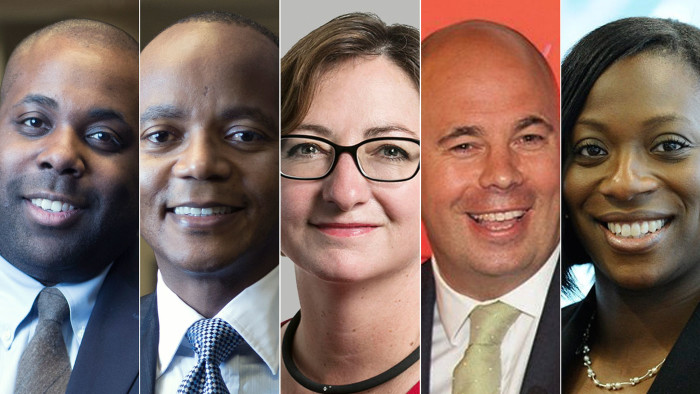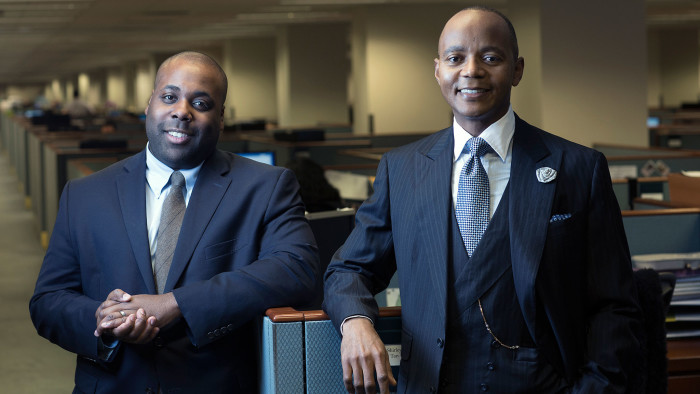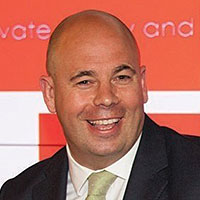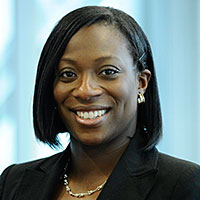Champions of change in the workplace

Roula Khalaf, Editor of the FT, selects her favourite stories in this weekly newsletter.
Governments can enact social, educational and housing policies to lessen inequality. But businesses also have a role to play in the way they recruit and promote people, and through diversity and inclusion programmes.
Now in its third year, the Architects of Meritocracy competition highlights programmes that are effective in levelling the playing field at work, with the aim of showing other organisations what can be done.
The competition is part of the InterLaw Diversity Forum’s Apollo Project, which seeks to promote best practice in encouraging diversity and inclusion. It is organised jointly with the FT’s Best Places to Work scheme, which highlights employers’ efforts to retain and engage staff.
Daniel Winterfeldt, a partner at law firm Reed Smith, is the driving force behind Apollo and the awards. “The hope of the project is to publicise practical case studies of successful programmes that have brought about cultural change [in organisations], in order to inspire managers to replicate and adapt them for their own businesses,” he says.
The judges in the 2016 awards selected four entries for an award: Lead, a cross-sector mentoring programme involving several New York financial services companies and law firms; the Legal Social Mobility Partnership in the UK; Supporting Modern Families, a programme to boost the careers of women and carers at law firm Pinsent Masons; and Hardwicke Chambers, whose approach shows the impact that schemes even in smaller workplaces can have on diversity and inclusion. Although the legal sector dominated this year, the competition is open to all employers.
Lawyers for Empowerment and the Advancement of Diversity

When John Mbiti realised that traditional mentoring schemes were failing to help young lawyers advance their careers, he decided to do something about it. By November 2015, Mr Mbiti, an in-house lawyer at Credit Suisse in New York, had led the formation of a cross-sector mentoring network, called Lead, and signed up many of the city’s big law firms and financial services companies.
What sets Lead — Lawyers for Empowerment and the Advancement of Diversity — apart is that its mentors aim to do more than give advice to their mentees, who are ethnic minorities, women and members of the LGBT community, for example.
The mentors also act as sponsors who make it possible for the young mentees to win new work. This is why Lead started with the idea of sending young law firm associates to be mentored by potential clients in the financial services sector. Lawyers are promoted on the back of the revenue they generate for their firms.
This disadvantages those whose backgrounds have not already involved making valuable business connections and those who suffer from the effects of unconscious bias.
“Business relationships tend to start from personal relationships,” points out Mr Mbiti. “The father was the client of a financial institution and refers his son to so-and-so and they meet because they are in the same social circles.”
Mr Mbiti was born and raised in Kenya and London and now lives in the US. “I certainly wouldn’t say that from a socio-economic side I was excluded,” he says. But as a black man in the US, his relative affluence has not always shielded him from prejudice.
The Lead programme started with 50 pairs of mentors and mentees and has grown to 70 pairs. They meet up once a month for an hour and the participating businesses host quarterly networking events.
Lead’s mentees have won work, moved jobs and become social justice activists themselves, while law firms and financial services companies looking to boost the diversity of their workforce, partly because of pressure from regulators, have created a new stream of potential recruits.
One of Mr Mbiti’s mentees, Ayo Badejo, says: “In addition to his mentorship, John has helped me establish relationships with a number of colleagues at Credit Suisse, which is extremely valuable.”
Ritu Ghai’s mentor helped her make the decision to move from New York law firm Sidley Austin to Thomson Reuters. “[We] determined that an in-house role at Reuters would be a great fit for my interests,” says Ms Ghai. In addition, Lead has helped her to maintain a relationship with her former law-firm colleagues.
More than 88 per cent of US lawyers are white, making it one of the least diverse professions in the US, according to US labour statistics collated in the American Bar Association 2016 report on lawyer demographics.
Hardwicke Chambers

The world of barristers is still very traditional, but Amanda Illing, chief executive of Hardwicke Chambers, says attitudes to diversity are changing. “Just the fact that we felt ready and confident to apply for the Apollo Project awards shows a big change. At Hardwicke, we have spent years creating a culture of diversity and inclusion,” she says.
This set of chambers, with 75 barristers and 25 staff, has entrenched these ambitions in its business plan and strategic objectives, she says. A quarter of the staff are from backgrounds that are typically under-represented.
Hardwicke’s senior leadership team are all female, and the high proportion of women working there (57 per cent) is unusual among barristers’ chambers. This has been helped its policies on parental leave and flexible working.
Hardwicke’s barristers and staff all undertake pro-bono work to support its programme of diversity initiatives. These include schemes designed to encourage students from all backgrounds to consider a career in the legal sector, such as holding mock trials to show them what is entailed and a 12-month placement for undergraduates on its marketing or IT teams.
Legal Social Mobility Partnership

In 2014 Barry Matthews decided to solve a problem he had faced as a teenager growing up on a council estate, which he saw being repeated in the next generation. “I wanted to create the work experience and support programme I craved as a 17-year-old,” he says. He would have liked work experience at well-known organisations that would have enhanced his CV and provided talking points in university interviews.
Mr Matthews is now director of legal affairs at ITV, the UK commercial television network, and the driving force behind the Legal Social Mobility Partnership, which launched in 2014. The scheme helps law firms including Slaughter and May (which submitted the Apollo entry), in-house legal teams and commercial partners collaborate to provide ways for more than 200 students from state schools in four English cities to experience working in the law.
LSMP’s two-week programme immerses participants in commercial organisations, backed up with training in legal and softer skills. Support networks such as a virtual coaching group for LSMP alumni on LinkedIn help students keep in touch afterwards.
Family Support Network

When Kizzy Augustin became pregnant as a young lawyer in 2009, she received detailed information from her employer, law firm Pinsent Masons, on its maternity leave policy. But Ms Augustin was still worried about the effect on her career of taking a break to have a baby. While on average 70 per cent of trainee solicitors at the firm are female, only 23 per cent of partners are women.
“I wanted to understand what happens next. What can I expect when I return? I realised we could be doing so much more to support this part of the process for parents and carers across the business,” says Ms Augustin. She is now a senior associate and chairs the law firm’s Family Support Network, which she set up with support from senior managers.
Pinsent Masons has developed schemes such as reciprocal mentoring and allows its lawyers to have more say on when and where they work. The firm creates opportunities for employees to meet each other’s families. It has also set up a website for advice and feedback, runs coaching sessions and runs events to help staff to juggle work and parenting.
…
The judges
The judging panel comprised: Leigh Murrin, chief legal operations counsel, General Electric; Rachael Davidson, UK general counsel and company secretary, National Grid; Helen Grant, MP for Maidstone and the Weald; Lisa Webley, professor of empirical legal studies, University of Westminster; Liz Grant, director/ owner, Fantail; Constantine Karides, partner, Reed Smith; Susan Henderson, head of international labour and employment, General Electric; and Carola Hoyos, editor, FT Executive Appointments and FT NED Club.
Entrants made submissions under a number of headings:
● Business case — how well does the project fit with the goals and strategy of the business?
● Innovation — how unusual is the project?
● Outputs — what is the measurable impact?
● Evidence — how thorough is the verification?
Comments